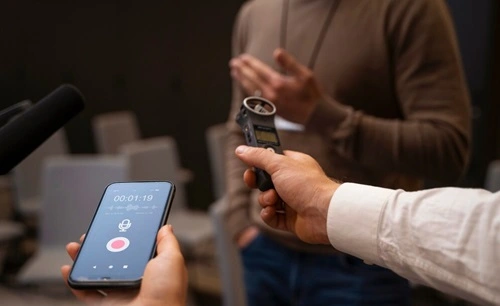Yes, it is illegal to record a conversation in Illinois without the consent of all parties involved in most situations. Illinois is an all-party consent state, meaning that everyone participating in a conversation must agree to the recording. Violating this law can result in severe criminal and civil penalties under the Illinois Eavesdropping Act (720 ILCS 5/14-1 et seq.).
Understanding Illinois Recording Laws

Illinois has some of the strictest recording laws in the country. These laws are designed to protect the privacy of individuals during private and confidential communications.
1. All-Party Consent
Illinois law requires that all parties to a private conversation consent to the recording. Without consent, the act of recording is considered a violation of the Illinois Eavesdropping Act.
2. Definition of a Private Conversation
A conversation is deemed private when at least one participant has a reasonable expectation of privacy, meaning the discussion is not intended to be overheard or recorded without consent.
3. Technological Applications
The law applies to recordings made through:
- Audio devices, including phones and recording gadgets.
- Video devices that also capture audio.
- Electronic communications, such as Zoom calls or online chats.
Penalties for Violating Recording Laws in Illinois
Recording a conversation without consent in Illinois can lead to serious legal consequences, including:
1. Criminal Penalties
- Felony Charges: Unlawful recording is typically a Class 4 felony, punishable by 1 to 3 years in prison and fines up to $25,000.
- Aggravated Offenses: In cases where the recording is used for harmful purposes, such as blackmail or harassment, charges may escalate to a Class 1 felony, with penalties of up to 15 years in prison.
2. Civil Liability
Victims of illegal recordings can file lawsuits for damages, including:
- Actual Damages: Compensation for any harm caused by the recording.
- Statutory Damages: Up to $10,000 per violation.
- Attorney’s Fees and Costs: Reimbursement for legal expenses.
Exceptions to the Rule
While Illinois generally requires all-party consent, there are notable exceptions:
1. Public Settings
If the conversation occurs in a public space where there is no reasonable expectation of privacy, consent is not required.
2. Law Enforcement
Authorized law enforcement officers may record conversations as part of an investigation if they obtain a warrant or meet specific legal requirements.
3. Emergencies or Crimes
Illinois law allows recording without consent if it is done to document a crime or gather evidence of an emergency threatening public safety.
Recent Legal Developments
1. Narrowing the Definition of Private Conversations
In 2014, the Illinois Supreme Court struck down parts of the Illinois Eavesdropping Act, ruling that it was overly broad. The revised law now applies only to private conversations where a reasonable expectation of privacy exists.
2. Workplace Monitoring
Employers in Illinois must notify employees if they intend to monitor workplace communications, including phone calls or emails, in compliance with the state’s privacy laws.
3. Digital Privacy and Smart Devices
The rise of smart devices like Alexa and Google Home has raised concerns about inadvertent recordings. Illinois courts have clarified that these devices must comply with all-party consent rules if recordings are made and shared without consent.
How to Legally Record Conversations in Illinois
- Obtain Consent: Secure the explicit agreement of all participants before recording.
- Document Consent: Record verbal consent at the start of the conversation or obtain written permission.
- Understand the Context: Ensure the conversation does not occur in a public or non-confidential setting where privacy laws may not apply.
- Avoid Secret Devices: Do not use hidden recording devices without proper consent.
Related FAQs
Q1. Can I record a phone call in Illinois without the other person knowing?
Ans: No, Illinois law requires the consent of all parties involved before recording a phone call.
Q2. Is it illegal to record a conversation I am not part of?
Ans: Yes, recording a conversation you are not involved in without consent is a violation of the Illinois Eavesdropping Act.
Q3. Can my employer record workplace conversations in Illinois?
Ans: Employers can monitor workplace communications, but employees must be notified beforehand.
Q4. Are there exceptions for journalists or whistleblowers?
Ans: Illinois law does not exempt journalists or whistleblowers from the all-party consent requirement, although public interest exceptions may apply in limited circumstances.
Q5. What happens if someone records me without my consent?
Ans: You may file a criminal complaint or pursue a civil lawsuit for damages under Illinois law.

